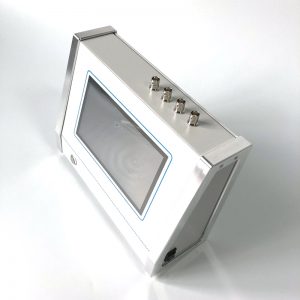 The application of impedance curves and admittance circles in the processing and production of ultrasonic devices is as follows:
The application of impedance curves and admittance circles in the processing and production of ultrasonic devices is as follows:
● Ultrasonic transducer: The admittance circle should not have parasitic circles, the resonant frequency should be as close as possible to the design frequency, the dynamic impedance should be low, the quality factor Qm should be close to the design requirements, and the capacitance should match the circuit.
Piezoelectric ceramic sheet: The device can be directly judged based on the admittance circle diagram and logarithmic coordinates. If there are layers or cracks inside the ceramic sheet, the logarithmic curve will have multiple peaks. Multiple parasitic small circles appear on the admittance circle diagram.
Ultrasonic horn and mold: Whether the design, processing, and assembly are reasonable or have defects can be clearly seen from the admittance circle diagram.
Ultrasonic welding machine: During production and processing, the results of the admittance circle are used to analyze the status of the welding machine, and problems with the welding machine are identified through parameter and graphic analysis.
Ultrasonic cleaning machine: During production and processing, the selection of vibrators requires their vibration performance to be as consistent as possible (bandwidth, quality factor, resonance frequency, dynamic impedance). On the admittance circle diagram, there should be no parasitic circles as much as possible or no parasitic circles near the resonance point. The admittance circle can be used to analyze and measure the impedance characteristics of the manufacturing, incoming material inspection, bonded transducers, and cleaning machines of the transducer. The measurement of the entire cleaning machine can calibrate the resonance frequency and static capacitance of the machine to match the power supply. It can analyze the characteristics of its new resonance point, impedance after water injection, capacitance, and vibration mode of the entire machine.
| Product name | Sound intensity measuring instrument | Numbering | |
| Model | PLS-SYJ100 | Date of inspection | |
| Testing base | Enterprise production specification | Detection parameter | The test sound intensity is 0.8W/cm², which meets the factory requirements |
| Test equipment parameters | Frekuensi: Khz, Kuasa: KW. | ||
| Test items | Sound intensity meter parameter measurement | Conclusion | Compliance with the factory-leaving standard of enterprises |
 Transduser ultrasonik,Generator ultrasonik,Pembersih Ultrasonik -SKSONIC
Transduser ultrasonik,Generator ultrasonik,Pembersih Ultrasonik -SKSONIC







